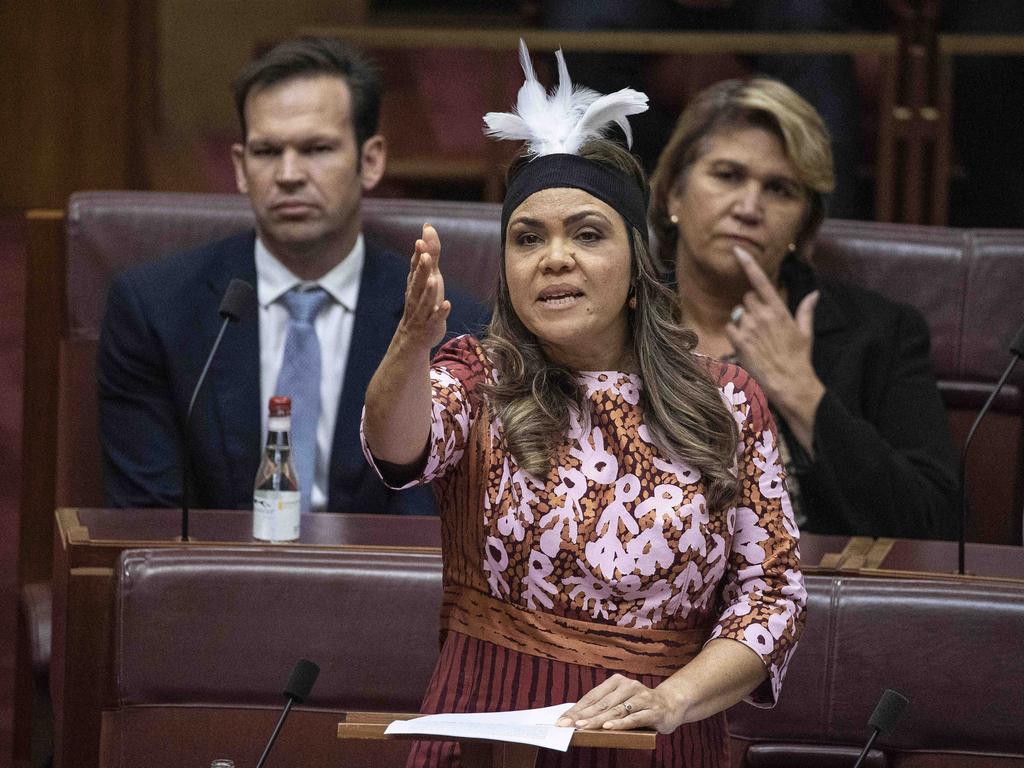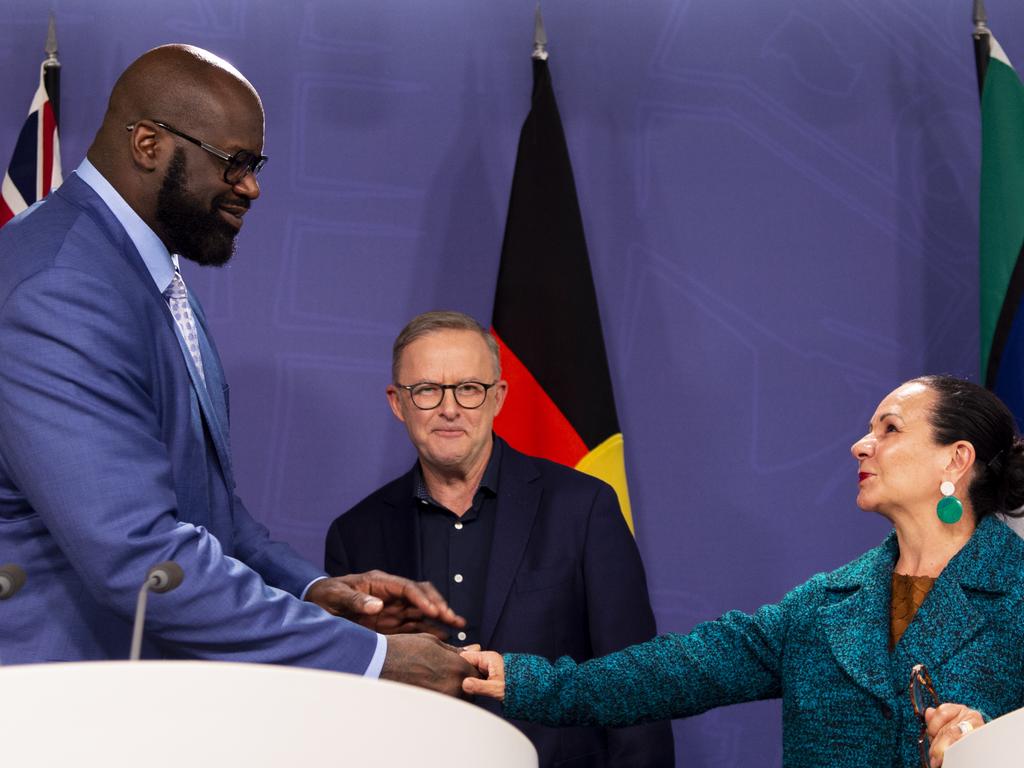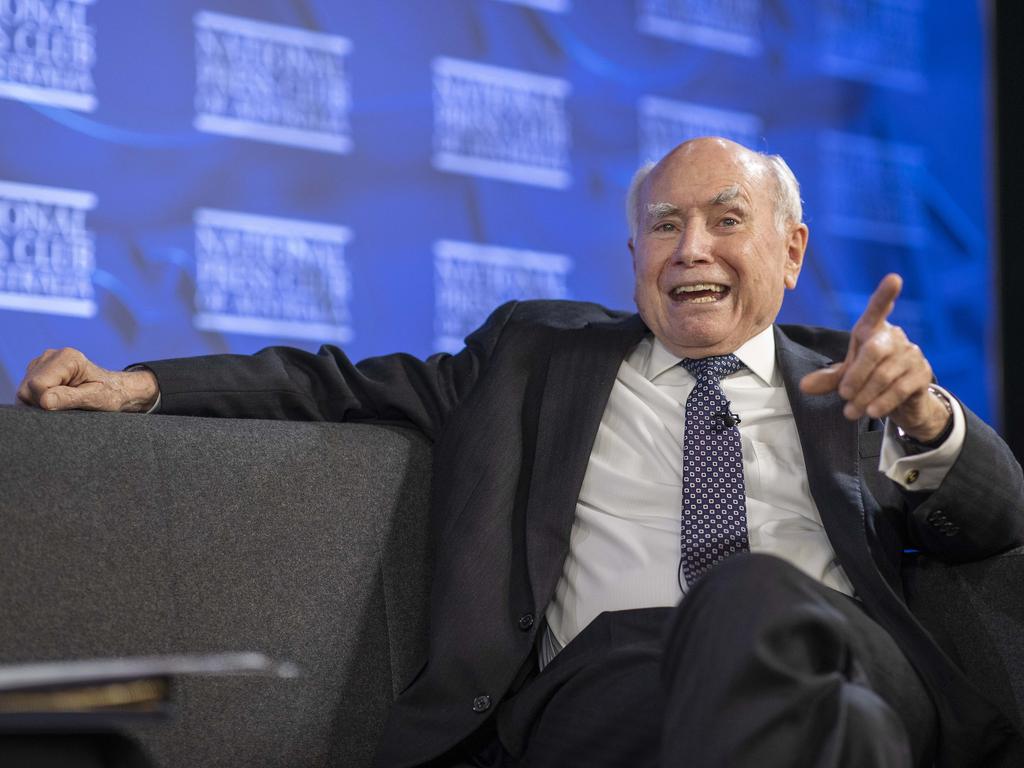
The overwhelming causes of failed reform are mission creep and duplicity. Anthony Albanese says cementing an Indigenous voice into the Constitution is not his proposal, it is owned by voice advocates. Yet, by releasing the wording for possible proposed constitutional change at Garma to much acclaim, seeking his place in history, Albanese cannot have it both ways. This is, inevitably, the Albanese Amendment, meaning the Prime Minister owns this debate, and the success or failure of a referendum.
And right now Albanese has bigger problems than looking like a dope for wasting time by wheeling out Shaquille O’Neal. The American former basketball player won’t have a clue about our governance rule book, otherwise known as our Constitution, let alone the extent of disadvantage in Indigenous communities. Yet using O’Neal to peddle the voice represents what has gone wrong with this debate.

The mission to establish an Indigenous voice has become an egregious breach of keeping reform modest and honest. To understand why, we need only revisit a piece written by Greg Craven in this newspaper in August 2014. Craven should reread his own work, too. He wrote: “Constitutional recognition of Australia’s Indigenous people is one of those deeply challenging, real issues. If we get this right, we can make a textually modest amendment to the most effective governing document in the world, with no constitutional fallout but a massive moral payload. If we bungle it, we can lose a referendum in such a way that it virtually repudiates the gains of the 1967 referendum that did so much to promote trust between Indigenous and non-Indigenous peoples.”
Replete with pleas for caution and modesty, Craven’s piece pointed out that any proposal “needs to work with our constitutional system, not against it. Constitutional conservatives, which is code for the vast majority of Australians, will never accept a radical proposal that goes against the grain of fundamental concepts such as parliamentary government and a common national identity.”
Craven, in 2014, was clear about what needed fixing and how. “We have two provisions with unfortunate racial connotations, section 25 permitting the disqualification of members of designated races from voting, and section 51 (26) authorising the commonwealth parliament to make laws directed towards particular races.”
Back then, Craven said “a technical drafting operation” done “under a local anaesthetic” could “fix the two existing provisions, which do indeed effect a distinction on the basis of race”.
Craven was modest, and right, in 2014. Repealing section 25 makes sense. That is a sensible amendment to our Constitution that many Australians may support.
Though a significantly bigger ask, a proposal to keep section 51(xxvi) but establish an Aboriginal and Torres Strait Islander voice whose sole purpose was to advise on special laws proposed under section 51(xxvi) (and no other head of power) is the next most modest change if we cannot agree to removing section 51(xxvi) as a racial provision that ought not appear in a Constitution in 2022.
A voice limited solely to 51(xxvi) laws is not ideal because it does entrench a permanent race-based division between Australians, but if parliament proposes to pass a law that has specific application to Indigenous people only, not to Australians at large, there is an argument that Indigenous people should be consulted on it.

This modest proposal, suggested also by Sydney barrister Louise Clegg on these pages last week, has been lost to dishonest mission creep. Restraint was also proposed by Frank Brennan in The Weekend Australian a few weeks earlier. Though Brennan’s proposal appears to go a little further than consultation on laws to be passed under section 51(xxvi), the core of his proposal is modest and, with a little finetuning, might be acceptable to many voters.
Unfortunately, the Albanese Amendment smashes both rules: it is neither modest nor is it being explained honestly by proponents. In fact, it is so far from modest reform it’s as if it were drafted by Greens senator Lidia Thorpe, who revels in her radicalism.
The Albanese Amendment fundamentally alters how we are governed by demanding an extra say on laws that affect all Australians under any head of power in the Constitution, with the weak proviso that such laws also in some way “relate to” Indigenous people.
Moreover, the Albanese Amendment does not limit the extra say given to a small group of Indigenous people to proposed acts of parliament. It gives this chosen group an extra say on any act or omission of executive government no matter how trivial.
Importantly, under the Albanese Amendment, parliament will be powerless to rein in or limit the activities of the voice. Because the Albanese Amendment expressly provides that parliament’s power to make laws regulating the voice is “subject to” the overriding purpose and function of the voice, it will be the High Court, not parliament, that will be ultimate decision-maker on the powers, functions, resources, timetables and impact of the voice. Parliament is not merely no longer supreme; it will be irrelevant on these matters.

Those words – “subject to this Constitution” – are warning bells for any practising constitutional lawyer but sadly, not for Craven in 2022. It is this mission creep, and the associated baloney of claiming the voice is modest when it is radical, that threatens to derail the voice referendum.
This raises an important lesson about legitimacy. Voice advocates should consider the merits of winning well. Their startling revolution demanded to our constitutional arrangements is not being honestly and openly explained. With some honourable exceptions, such as Malcolm Turnbull, who admits the enormous change the voice will bring, advocates are still pretending this is a modest change. Not content with trying to mislead us into agreeing to this radical change to our democracy, many advocates have labelled those who ask questions as racists, idiots and ideologues. Bullying and coercion is no way to engender reconciliation. Winning well means being honest and showing respect to those with different views.
As Craven said in 2014: “It is not racist to oppose Indigenous constitutional recognition because you worry about its wider effects on constitutional interpretation.”
Amen to that, Professor.








With the Prime Minister marking 100 days in office this week, assuring us he hasn’t wasted a day, it is time to reflect on two golden rules of constitutional reform: keep it modest and keep it honest.